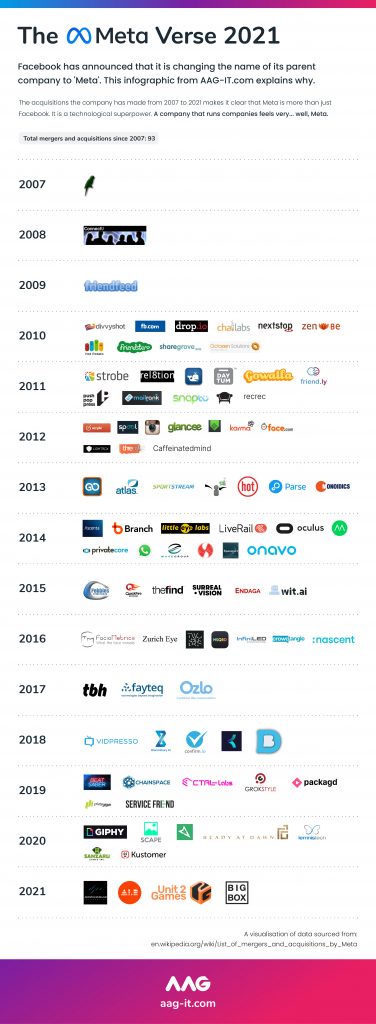The recent announcement that Facebook is changing its name to Meta might come as a surprise to many people. In this article, Alexa Greaves, CEO at AAG-IT.com provides an overview of the change, including why it happened and what it means for most people.
Firstly, it’s worth clarifying that before this week ‘Facebook’ was really the name for two things:
- ‘Facebook’, the social media platform
- ‘Facebook Inc.’, the parent company which owns Facebook, Instagram, Whatsapp and more.
The name change refers to the parent company, which will now be known as ‘Meta’.
Why has Facebook changed its name?
There are many reasons Meta has likely chosen to make this change now. The cynical view is that this is part of a PR move to distance the parent company from the recent issues faced by ‘Facebook’ the social media platform. That’s probably only a small part of it.
The parent company owns dozens of smaller entities. Most famously Instagram and Whatsapp, but also many technologies that help Meta to improve data processing and provide ground-breaking virtual reality and augmented reality services.
The name change is unlikely to be a spur-of-the-moment decision or a knee-jerk reaction to some bad press. More likely it’s a way of making the parent company a distinct entity, free from the associations with the social media platform.
It gives a clearer picture in the eyes of the general public (and investors) that Facebook is just one part of Meta’s arsenal. It will make any future acquisitions in the tech space feel much more natural and sensible.
This mirrors the decision by ‘Google’ to rebrand as ‘Alphabet’, separating the parent company from the public image of the search engine.
What does it mean for me?
For the vast majority of people, the name change doesn’t mean anything. Facebook the social media platform is still called Facebook. It’s just owned by a company with a different name.
Why Meta?
Meta is a very neat way of explaining how the parent company sees itself. Many of the company’s recent acquisitions have been in the virtual/augmented reality space. The highest-profile purchase in recent years was Oculus, the VR gaming equipment.
‘Meta’ is most commonly used as a way of indicating something that ‘sits above’ something else. For example, ‘Metascience’ would be scientific research into scientific research. ‘Metanews’ is news about the news. ‘Metapolitics’ is the politics of politics.
In this way, Meta is reflecting that the parent company sits at a higher level than its assets. A company that owns and runs companies.
However, ‘meta’ also likely refers to the additional layer of experience which is provided by virtual and augmented reality technology. Mark Zuckerberg has suggested that this move is the first step towards his company creating a ‘Metaverse’ (where users can attend virtual concerts, virtual meetings, and more).
How successful ‘Meta’ will be in creating a ‘Metaverse’ will depend on adoption. Virtual reality is still a fringe technology, despite growing popularity. However, they are the best-placed company in the world to achieve the ambitious task.


